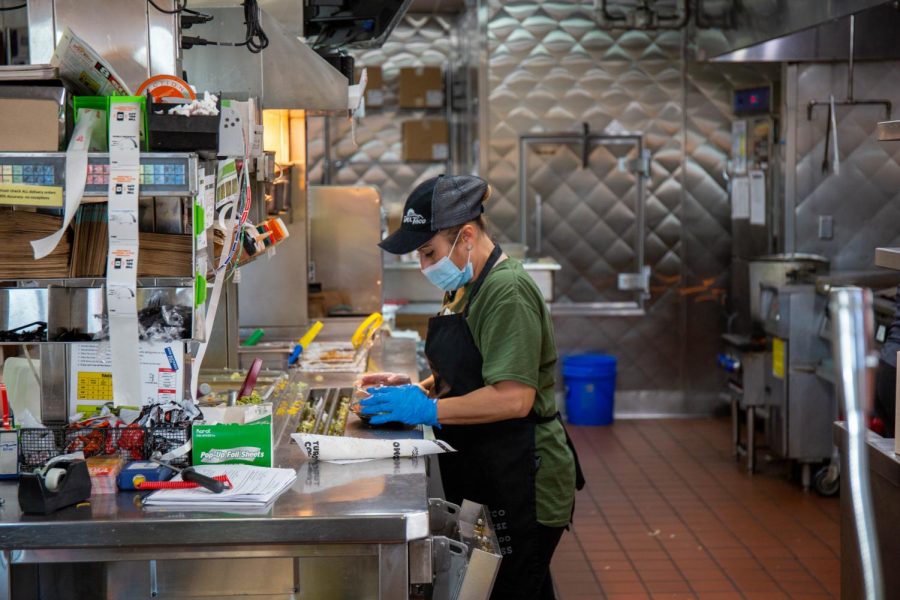What a $15 Minimum Wage Would Mean for Utah
Silvia Ocampo prepares drive through orders at Del Taco on 800 E and 400 S in Salt Lake City on Nov. 14th 2020. (Photo by Gwen Christopherson | The Daily Utah Chronicle)
March 26, 2021
Since he was a little kid, Patrick Foley wanted to go to the University of Utah. His parents studied here, and he was born in the University hospital. But, being from California, he pays out-of-state tuition and has to work two jobs to support his studies. Foley said, even with two jobs, finding money to survive can be difficult.
In Utah, the minimum wage is only $7.25. That is the national minimum wage, which has not been changed since 2009, when it was raised from $5.15 to $7.25 to account for inflation.
Inflation plays a huge role in the economy. In 1968, the highest minimum wage point was about $1.60 an hour, which would be about $10.15 now if adjusted for inflation and labor productivity. Labor productivity has also gone up, meaning that the equivalent of $1.60 is over $15 in 2021.
In Utah, a living wage for a single person with no children is about $14.52 an hour. This means that anyone without the means to obtain a job above minimum wage must work at least two jobs in order to simply survive, even if they are only supporting themselves. 48.5% of Utahns work a job that pays less than $15 an hour.
While many people and politicians believe that the only people affected by minimum wage changes are teenagers and college students, low-wage workers are disproportionately women, people of color, and immigrants.
Additionally, the effect of raising Utah’s minimum wage would likely not increase the state’s unemployment in any significant way but would increase the money put back into the economy.
“I think one of the reasons why we don’t see these big disemployment effects is because the minimum wage will put money into the hands of people who are likely to spend it—people who are lower on the income scale in the first place and who have needs, who have things they need to spend money on,” said Tom Maloney, an economics professor at the U who specializes in issues of socioeconomic inequality.
While large corporations receive stimulus money from the government in an attempt to bolster the economy, Maloney says giving more money to average citizens who can then return it to the local economy is more effective. While companies would have to put more money towards employees, he argues that that is a positive aspect for the local economy as it will encourage businesses to invest in their employees.
“It raises income for those people, it generally reduces turnover, so it attaches people to jobs, helps promote stability, it puts money in the pockets of these people so they can spend it, and that’s good for local businesses,” Maloney said.
A $15 minimum wage could also go a long way to improve students’ standard of living, as well as mental health. Foley moved to Utah in December. He works two jobs, which pay about $9 an hour each. While this is above minimum wage, he also pays for school, which is about $27,000 per year for an out-of-state student.
Even working two jobs, Foley expects to graduate with around $20,000 of student debt, if not more. Because of this imminent debt, he forgoes many of his personal hobbies, like photography and film, which he would like to one day make into a career.
One of his paychecks goes to rent each month, while the other one goes towards things like groceries, bills, and savings, leaving little room to pursue other interests.
“Even just a couple more bucks raised on the minimum wage would mean a lot more,” Foley said. “Because it’s a lot more breathing room… I’d have more money to save for school, and on top of that, more to spend on personal hobbies.”
According to CNBC, raising the minimum wage could also help to pull women and marginalized groups out of poverty and close race and gender wage gaps.
“I think it’s time for an aggressive increase,” Maloney said. “I think it will have positive impacts for workers and for the broader economy.”









Ryan • Nov 11, 2021 at 7:26 pm
I work for Alsco in southern Utah and I only make $11.50 per hour. During the winter we don’t even work forty hours a week. The state needs to raise the minimum wage to $15 an hour way before 2026 especially with how the prices keep rising because of this pandemic.
Mitra • Aug 31, 2021 at 11:42 am
I want move to Utah I am from California and I earn $20 an hour I need to know exactly minimum wage of Utah per hour please?
John Hedberg • Apr 3, 2021 at 12:31 pm
President Biden’s own CBO projects 1.4 million jobs lost if the federal minimum wage is raised to $15/hour. That’s 1.4 million college students who will have to find some other way to make up for the lost wages they missed because the jobs were simply no longer there.
https://www.cnbc.com/2021/02/08/raising-minimum-wage-to-15-would-cost-1point4-million-jobs-cbo-says.html